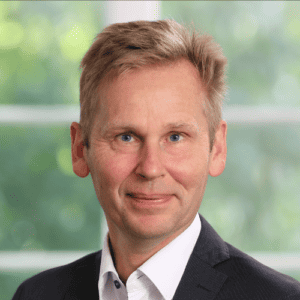
Interview with Peter Ullrich, Master Trainer at Staufen
Peter Ullrich has been active as a trainer and consultant for specialists and managers for over 20 years. As a master trainer at the Staufen Academy, he is responsible for the content and didactics of the Lean Expert and Lean Trainer training series.
In the following interview, he talks about the positive changes that lean can bring to a company, what makes the Staufen Academy’s lean training courses so special, and how they ensure maximum transfer of the content to the real world.

Peter Ullrich
Master Trainer, Head of Content & Didactics
STAUFEN.AG

Peter Ullrich
Master Trainer, Head of Content & DidacticsSTAUFEN.AG
Peter Ullrich has a degree in physics and is a professional Scrum Master. He is a trainer at Staufen Academy and is also responsible for trainer staffing and instruction. He has operational leadership experience and manages international clients and projects. Peter Ullrich is an expert in engaging people in change projects and is experienced in training and consulting in direct and indirect areas. He also has extensive industry experience in mechanical and plant engineering, vehicle construction, services, and electrical engineering.
Peter Ullrich can look back on 20 years of experience in optimizing technical workflows and business processes and over 15 years of experience as a trainer and facilitator of change processes.
What brought you to lean?
Peter Ullrich: In the early 2000s, I worked as a technical project manager for an electronics manufacturing company. The CEO at the time introduced the topic of lean production to our company. Using lean principles and methods, we began by significantly improving the production system – from on-time delivery and lead times to quality and flexibility. Then we optimized the engineering processes. This has allowed us to reduce prototype lead time from 21 days to 3 days! Since then, I have been absolutely hooked on lean.
What positive changes can lean bring to other areas?
Peter Ullrich: When lean is understood and applied holistically, it has a positive impact on everything: customers, the business, and employees. It is a highly effective way to support issues such as skills shortages, sustainability, continuous transformation capability, supply chain stabilization, cost pressures, agility, or digitalization. As a Staufen trainer, I empower managers and employees to recognize and sustain the potential that lean offers to solve these challenges.
What makes lean training from Staufen different?
Peter Ullrich: In all modesty, I can say that it involves several aspects at once. It starts with the practical relevance of the training. One of the ways we ensure this proximity is by working on and practicing specific tasks from the participants’ daily work. In addition, training content is developed by consultants who work with customers on a daily basis and know which topics are relevant to businesses.
Are there other practical aspects to lean training?
Peter Ullrich: When training content allows, some days will be held on-site at the Staufen Academy’s partner companies. Participants not only gain an in-depth understanding of how to successfully implement the lean approaches and methods taught, but also conduct optimization workshops with real tasks in these companies. This allows them to practice becoming a lean expert directly while training.
When lean is understood and applied holistically, it has a positive impact on everything: customers, the business, and employees.
Peter Ullrich
Project Manager, Staufen.Ag
How is the concept of your lean training received by participants?
Peter Ullrich: They are inspired! Because our Staufen trainers have extensive experience in what they teach. They can use many of their own real-world examples to explain and reinforce training content. We also make sure that our training sessions are very diverse. For example, we use an extensive mix of media in our seminars and ensure that participants share their experiences with each other.
In lean, the human factor plays an important role. How much do you focus on this in your lean training?
Peter Ullrich: We place great emphasis on strengthening the personalities and roles of future lean experts and lean trainers – for a professional appearance, for the ability to communicate more clearly and directly, to present facts in an engaging and understandable way, or to lead workshop teams and manage improvement projects independently. It is also important to us that participants learn to sensitize others to change in general and to lean in particular, and even to win over critical employees as co-creators in change projects.
You might also be interested in

“This is not a one-time project – it is a lean enterprise journey”
You could call it a large medium-sized company: Kreissparkasse Göppingen has total assets of 6.3 billion euros, more than 60 branches and self-service locations, and more than 1,000 employees. The bank is a member of the BestPractice partner group of Staufen AG. It represents companies that have implemented BestPractice solutions in their organization and processes.
Read more
Qualification Programs
In our training programs, we focus our full attention on sustainable empowerment of your managers and employees.
Read more
Lean Expert and Trainer Training
Effective, competent and appreciative at eye level – that’s what our training series stands for. In the same way, our graduates pass on their know-how internally and support your improvement process with workshops and projects. Because with improvement experts in your own company, you create the best conditions for sustainably exploiting your optimization potential.
Read more
